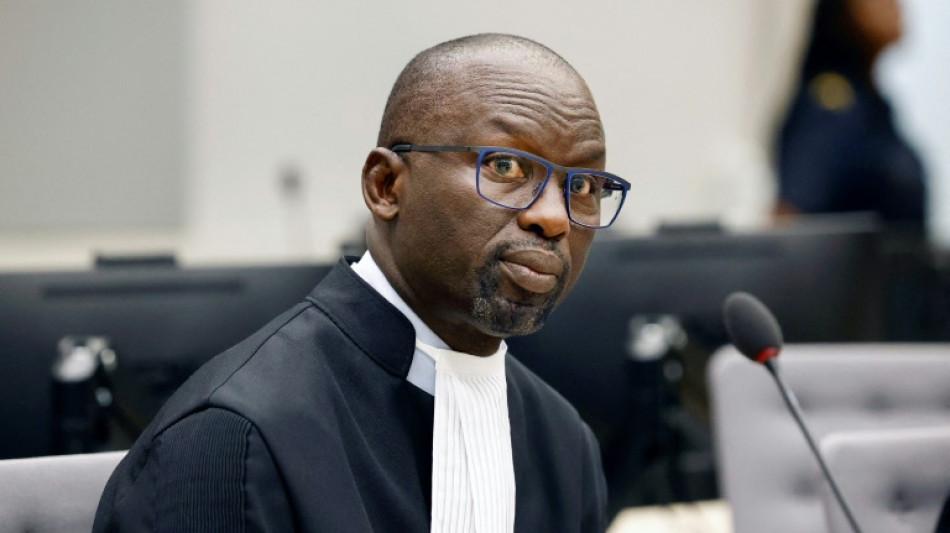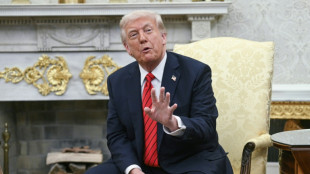
-
 Israel cancels visas for French lawmakers
Israel cancels visas for French lawmakers
-
Russia and Ukraine trade blame over Easter truce, as Trump predicts 'deal'

-
 Valverde stunner saves Real Madrid title hopes against Bilbao
Valverde stunner saves Real Madrid title hopes against Bilbao
-
Ligue 1 derby interrupted after assistant referee hit by projectile

-
 Leclerc bags Ferrari first podium of the year
Leclerc bags Ferrari first podium of the year
-
Afro-Brazilian carnival celebrates cultural kinship in Lagos

-
 Ligue 1 derby halted after assistant referee hit by projectile
Ligue 1 derby halted after assistant referee hit by projectile
-
Thunder rumble with record win over Memphis in playoff opener

-
 Leverkusen held at Pauli to put Bayern on cusp of title
Leverkusen held at Pauli to put Bayern on cusp of title
-
Israel says Gaza medics' killing a 'mistake,' to dismiss commander

-
 Piastri power rules in Saudi as Max pays the penalty
Piastri power rules in Saudi as Max pays the penalty
-
Leaders Inter level with Napoli after falling to late Orsolini stunner at Bologna

-
 David rediscovers teeth as Chevalier loses some in nervy Lille win
David rediscovers teeth as Chevalier loses some in nervy Lille win
-
Piastri wins Saudi Arabian Grand Prix, Verstappen second

-
 Kohli, Rohit star as Bengaluru and Mumbai win in IPL
Kohli, Rohit star as Bengaluru and Mumbai win in IPL
-
Guirassy helps Dortmund past Gladbach, putting top-four in sight

-
 Alexander-Arnold lauds 'special' Liverpool moments
Alexander-Arnold lauds 'special' Liverpool moments
-
Pina strikes twice as Barca rout Chelsea in Champions League semi

-
 Rohit, Suryakumar on song as Mumbai hammer Chennai in IPL
Rohit, Suryakumar on song as Mumbai hammer Chennai in IPL
-
Dortmund beat Gladbach to keep top-four hopes alive

-
 Leicester relegated from the Premier League as Liverpool close in on title
Leicester relegated from the Premier League as Liverpool close in on title
-
Alexander-Arnold fires Liverpool to brink of title, Leicester relegated

-
 Maresca leaves celebrations to players after Chelsea sink Fulham
Maresca leaves celebrations to players after Chelsea sink Fulham
-
Trump eyes gutting US diplomacy in Africa, cutting soft power: draft plan

-
 Turkey bans elective C-sections at private medical centres
Turkey bans elective C-sections at private medical centres
-
Lebanon army says 3 troops killed in munitions blast in south

-
 N.America moviegoers embrace 'Sinners' on Easter weekend
N.America moviegoers embrace 'Sinners' on Easter weekend
-
Man Utd 'lack a lot' admits Amorim after Wolves loss

-
 Arteta hopes Arsenal star Saka will be fit to face PSG
Arteta hopes Arsenal star Saka will be fit to face PSG
-
Ukrainian troops celebrate Easter as blasts punctuate Putin's truce

-
 Rune defeats Alcaraz to win Barcelona Open
Rune defeats Alcaraz to win Barcelona Open
-
Outsider Skjelmose in Amstel Gold heist ahead of Pogacar and Evenepoel

-
 Arsenal make Liverpool wait for title party, Chelsea beat Fulham
Arsenal make Liverpool wait for title party, Chelsea beat Fulham
-
Trump slams 'weak' judges as deportation row intensifies

-
 Arsenal stroll makes Liverpool wait for title as Ipswich face relegation
Arsenal stroll makes Liverpool wait for title as Ipswich face relegation
-
Sabalenka to face Ostapenko in Stuttgart final

-
 Kohli, Padikkal guide Bengaluru to revenge win over Punjab
Kohli, Padikkal guide Bengaluru to revenge win over Punjab
-
US aid cuts strain response to health crises worldwide: WHO

-
 Birthday boy Zverev roars back to form with Munich win
Birthday boy Zverev roars back to form with Munich win
-
Ostapenko eases past Alexandrova into Stuttgart final

-
 Zimbabwe on top in first Test after Bangladesh out for 191
Zimbabwe on top in first Test after Bangladesh out for 191
-
De Bruyne 'surprised' over Man City exit

-
 Frail Pope Francis takes to popemobile to greet Easter crowd
Frail Pope Francis takes to popemobile to greet Easter crowd
-
Lewandowski injury confirmed in blow to Barca quadruple bid

-
 Russia and Ukraine accuse each other of breaching Easter truce
Russia and Ukraine accuse each other of breaching Easter truce
-
Zimbabwe bowl Bangladesh out for 191 in first Test in Sylhet

-
 Ukrainians voice scepticism on Easter truce
Ukrainians voice scepticism on Easter truce
-
Pope wishes 'Happy Easter' to faithful in appearance at St Peter's Square

-
 Sri Lanka police probe photo of Buddha tooth relic
Sri Lanka police probe photo of Buddha tooth relic
-
Home hero Wu wows Shanghai crowds by charging to China Open win


Catching the world's most wanted: the ICC's impossible task
The arrest on Tuesday of former Philippines President Rodrigo Duterte, by police acting on an International Criminal Court warrant tied to his deadly war on drugs, marks a success for the ICC, which has been struggling for almost 23 years against a lack of recognition and enforcement power.
Backed by 125 member states, the jurisdiction seeks to prosecute individuals responsible for the world's gravest crimes when countries are unwilling or unable to do so themselves.
The wheels of international justice grind slowly, as evidenced by the court's low conviction rate.
However, it’s not all about the final judgement, experts say.
The mere fact of pursuing alleged perpetrators of atrocities sends a message that the international community is determined to fight impunity.
- Catch me if you can -
Since it began work in 2002, the ICC has opened 32 cases for alleged war crimes, crimes against humanity, genocide and offences against the administration of justice.
Fourteen of them, or roughly 40 percent, are ongoing, in most cases because the suspects are still at large.
Without a police force, the Hague-based court is unlikely to catch them soon.
Of the 60 arrest warrants issued since 2002, only 21 had been carried out before Duterte's arrest.
The ICC relies on states to apprehend suspects.
But the incentive for them to cooperate is low because the court has "nothing to offer in return, except a commitment to seeing justice served", former ICC adviser Pascal Turlan said.
The court's wanted list includes Russian President Vladimir Putin, Israeli Prime Minister Benjamin Netanyahu and Ugandan warlord Joseph Kony. All three are accused of war crimes.
Russia is one of dozens of nations, including the United States, Israel and China, that do not recognise the jurisdiction of the ICC, hampering its ability to investigate their nationals.
But some member states also defy its authority by, for instance, refusing to hand over suspects.
"When states don't like what the ICC does, they don't often cooperate," said Nancy Combs, professor of law at William & Mary Law School in the United States.
- 11 convictions, all Africans -
ICC spokesperson Fadi El Abdallah stressed that the court's role is not to go after all suspected war criminals but to "encourage nations to deal with their own cases".
Each case comes with a unique set of challenges, from interference by national governments to witness intimidation.
The latter caused the case against Kenya's former deputy president William Ruto to fall apart in 2016, according to a former chief prosecutor.
These challenges partly explain the court's low conviction rate.
Since its inception it has handed down 11 guilty verdicts, mostly against officials from the war-torn Democratic Republic of Congo (DRC), and four acquittals.
All those judged were Africans, leading to accusations that the ICC is unfairly targeting the continent.
Combs pointed out that some African countries, including Uganda, Ivory Coast and the DRC, had referred their own wars to the court for investigation in the early days, while other cases had been instigated by the United Nations Security Council.
"The ICC has diversified a lot but non-African states have resisted ICC jurisdiction more fiercely," she pointed out, citing Russia as an example.
L.Maurer--VB
